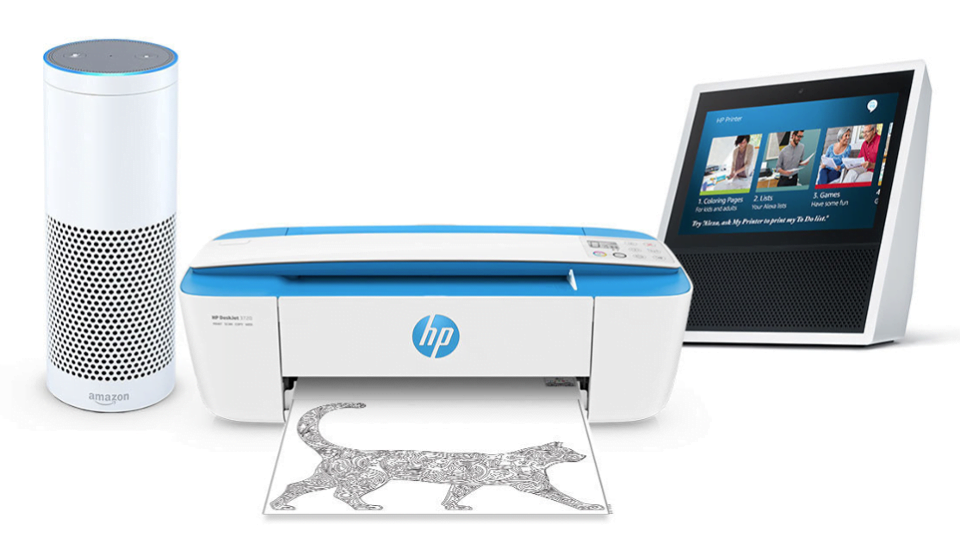
Last year, HP Inc. became the first company to enable voice commands into its printers via smart home speaker platforms, with its launch of voice control capabilities for Google Home and Microsoft Cortana. This past week, the company announced it was further building out this capability by adding Amazon.com’s Alexa to its roster. This announcement comes on the heels of CES 2018, where we saw HP and everybody who’s anybody in the consumer electronics space unveil and demonstrate a host of new products, many in the smart home and home automation sectors. For more on what’s going on in this area, see our home automation analyst Mark Vena’s write-up on the event). I see voice control for printers as an obvious extension of the current smart home trend and glad HP Inc. made it happen. The experience is not ideal or complete, but it is a good start.
HP Inc.’s new voice-activated printing capabilities now extend to the three current top dog smart home speaker platforms—Amazon Alexa, Microsoft Cortana, and Google Home. All you have to do is say “Alexa, print my shopping List…” “Hey Cortana, ask HP Printer for help…” or “Ok Google, print my Google Calendar to…”. The available content varies somewhat across the three different platforms. You can use voice commands to print some useful things—shopping lists, calendars, Sudoku puzzles, blank graph paper, to name a few. I am sure these capabilities will continue to expand over time—frankly, they must if this is going to truly be a useful service. It is still in the early stages, but it has got much potential.
To make voice commands even more useful, I would love to see HP extend it to printer troubleshooting and setup with a natural back and forth between user and printer. I think this would address many of the printing headaches people have. Now that would be a truly intelligent assistant.
HP says these capabilities are just the first step towards a fully-responsive home office or business. In the future, the company says users will be able to talk directly to their printers, without even having to use a smart home as a go-between. I read that as an intelligent assistant built into the printer itself. That would be nice if for no other reason to get all the clutter off my desk. The printer chassis sure have much room for a speaker, and most already have a display. HP also predicts that voice services will become more smart and proactive, utilizing AI to infer users’ intents and needs (automatically printing boarding passes before a flight, etc.). Now that Apple HomePod is in the picture, I am also interested to see when and if HP and Apple will extend its voice control support to include it. Apple has the first move there.
Wrapping up
These capabilities are an obvious extension of the smart home movement, and I am glad to see someone like HP Inc. taking a leadership position here. Technology is advancing at a rapid pace within the smart home sector, and there’s a lot of opportunities right now for companies to examine how they can improve upon classic home components that have been taken for granted (Intel is another great example of a company doing this, with its new smart home initiatives ). Printers cannot be forever stuck in the 2000s—with this new voice control technology; HP Inc. is taking the necessary first step in bringing them into the smart home picture.
Disclosure: My firm, Moor Insights & Strategy, like all research and analyst firms, provides or has provided research, analysis, advising, and/or consulting to many high-tech companies in the industry, including Advanced Micro Devices, Applied Micro, Apstra, ARM Holdings, Bitfusion, Cisco Systems, Dell EMC, Diablo Technologies, Echelon, Ericcson, Frame, Gen Z Consortium, Glue Networks, GlobalFoundries, Google (Nest), HP Inc. Hewlett Packard Enterprise, Huawei Technologies, IBM, Jabil Circuit, Intel, Interdigital, Konica Minolta, Lenovo, Linux Foundation, Mapbox, Mesosphere, Microsoft, National Instruments, NOKIA, Nortek, NVIDIA, ONUG, OpenStack Foundation, Peraso, Pure Storage, Qualcomm, Rackspace, Rambus, Red Hat, Samsung Technologies, Silver Peak, SONY, Springpath, Sprint, Stratus Technologies, Synaptics, Vidyo, Xilinx, Zebra, which may be cited in this article. I do not hold any equity positions with any companies cited in this column.
[“Source-forbes”]










